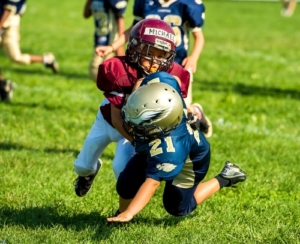Study Says: Youth Tackle Football Leads to Earlier Signs of Brain Disease
The term “chronic traumatic encephalopathy” may not be familiar to you, but there is a good chance you’ve heard of CTE. This acronym stands for the degenerative brain disease that is linked to professional football players. However, a new study has found that children who play youth tackle football before the age of 12 are more likely to show early symptoms of brain disease. And that is a serious, life-altering problem.
Early Signs of CTE Caused by Brain Trauma in Kids
Head trauma of any sort is debilitating, whether temporarily or permanently. People in car accidents often suffer a brain injury, and no matter how small, recovery can be brutal and lengthy. And that’s just from one head trauma. Imagine suffering blows to the head or jarring hits repeatedly. Imagine if these hits begin at an incredibly young age. How does the brain suffer?
Neuropathologist Dr. Ann McKee has uncovered the neurological risks of playing youth tackle football through her work regarding CTE. Because CTE can only be diagnosed after death during an autopsy of the proteins in the brain, in her latest study, McKee also relied on detailed behavioral questionnaires and interviews completed by the relatives of deceased football players.
She expected to find more severe symptoms of CTE in the brains of deceased professional football players who started playing the game young since they may have suffered hundreds and even thousands of extra head impacts as children. What she discovered was shocking.
Early exposure to youth tackle football was not associated with more severe signs of CTE, but it was linked with the football players showing cognitive impairment, mood swings, and other brain injury symptoms earlier in their lives.
Hitting Pause on Youth Football
Many young football players and their parents have dreams of high-level college ball and, later, the NFL, but only the smallest fraction of football players go on to play pro ball. Getting on the field earlier by playing tackle football is no indication of potential or success – Tom Brady did not play football until his freshman year of high school. Ultra-competitive University of Michigan coach Jim Harbaugh promotes kids playing soccer until they’re in eighth grade, then moving on to football. (Though this recommendation would seem to be more about developing agility, coordination, balance, footwork, and conditioning and less about brain health.)
Earlier research found that children who participate in organized youth tackle football before the age of 12 are twice as likely to experience apathy, behavioral fluctuations, problem-solving struggles, and difficulty executing tasks. They are three times as likely to be diagnosed with depression.
Some boys seem built to play football, with their stocky bodies or incredible speed. But looking like a football player or loving the game of football doesn’t mean your child should give up their future. The risk of head injury in youth tackle football is great. No amount of helmet protection is enough to completely stop every traumatic brain injury from occurring.
The ultimate recommendation, supported by McKee’s data, is that tackle football should not be played until a person is more physically mature. But her next bit of work will involve determining just how long kids can play football before their risks of signs of CTE rise exponentially.
Have you suffered a brain injury because of someone else’s negligence? Contact Thurswell Law for a free consultation with one of our experienced brain injury attorneys. We do not charge any fees unless you collect. Call (248) 354-2222 today to schedule your consultation







